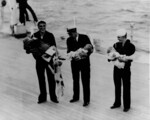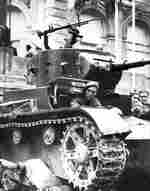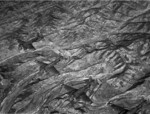
Spain
| Full Name | 33 The Spanish State | |
| Alliance | Neutral or Non-Belligerent | |
| Population in 1939 | 25,637,000 | |
| Military Deaths in WW2 | 4,500 |
Contributor: C. Peter Chen
ww2dbaseIn 1931, the Second Spanish Republic was established. Although social progress was made under this government, political instability led to the Spanish Civil War which began in 1936. The right-wing Nationalists sparked off their rebellion on 17 Jul 1936, taking Seville, Pamplona, Cádiz, Jerez de la Frontera, Córdoba, Zaragoza, and Oviedo very quickly. On the third day of the rebellion, General Francisco Franco took over after the death of José Sanjurjo in a plane crash. The rebellion was widely supported by nationalists, fascists, monarchists and a portion of the religious right who felt threatened by the Spanish Republic. While the United Kingdom fought hard to remain neutral, which actually hurt the Republicans, Germany, Italy, and Russia jumped into the conflict. Italy sent 60,000 men into the fight as volunteers for the Nationalists, while Germany took the chance to evaluate new artillery, armor, and aircraft in combat situations also on the side of Franco. The Russians, on the other hand, sent in their supplies for the Republicans. On foreign soil, the Germans realized the usefulness of the 88mm anti-aircraft guns against ground units, while the Russians developed tactics for I-15 and I-16 aircraft; all those weapons played important roles in the upcoming European War. The conduct of the war was brutal with both sides committing massacres of civilians and prisoners. In the end, as Franco emerged victorious and established his Spanish State. An estimated 300,000 to 1,000,000 people lost their lives. With the Nationalists now in control, deep hatred was felt against the atrocities committed by the Russians. Many Spaniards simplied the reason for the Civil War, blaming communism for the prolonged conflict that killed so many. This hatred was joined by Catholics and monarchists who might not necessarily be the Nationalists' political allies, which created an unified anti-communist front on the Spanish socio-political stage.
ww2dbaseFranco established a fascist government in Spain, aiming to use Germany and Italy as a model to establish a modern Spain that would once again be a world power. This led to the fear in United Kingdom and France that Spain would join the Axis alliance. Should open hostilities began, France would then be in a very vulnerable position, fighting a two-front war; meanwhile, the United Kingdom understood that her strategic garrison at Gibraltar would be in danger. Adolf Hitler remained on friendly terms with Franco after the Spanish Civil War, and after Sep 1940, actively courted Franco to join him in his cause. To the relief of the Western Allies, however, Franco remained non-belligerent. Franco stalled Hitler's requests draw Spain directly into war, in part by making demands of large quantities of German war supplies (so much that Hitler would not easily agree) and in part by secretly approving Spanish volunteers to fight under German command and approving German intelligence agents to operate in Spain (so to slightly appease Hitler's needs). At the same time, Franco knew Hitler's ambitions well, and he secretly manned the French border and the southern coasts of his country to counter any potential show of force by Germany. By the end of 1940, Germany's need for Spain to openly join the conflict largely subsided, but Hitler continued to press for Franco's cooperation. In Dec 1940, Germany requested the right of passage so that German troops could strike Gibraltar via land; Franco refused, and that was largely the end of active negotiations between Germany and Spain.
ww2dbaseWhen Germany invaded Russia in Jun 1941, the anti-communist sentiment in Spain was resurfaced. Knowing the recent event of Germany relatively easily toppling Poland and France, the Spanish thought Germany would be able to do the same to the Soviet Union. A large-scale demonstration broke out in the capital city of Madrid in support of the invasion, followed by demonstrations in other cities. The Spaniards were shocked when the United Kingdom befriended communist Russia, realizing that an Allied victory would mean the expansion of communism. Thus, Spanish volunteers began to be organized. On 20 Aug 1941, German Army 250th Division was officially formed with the nickname of "Blue Division"; the division consisted of Spanish volunteers and was commanded by General Agustín Muñoz Grandes of the Spanish Army. The Blue Division fought exclusively on the Eastern Front against Russia, and suffered as much as other German units when the tide turned against Germany. On 29 Jul 1943, the United States ambassador in Madrid demanded that Spain withdrew this military force from Russia. Franco, seeing that the Allies had just begun the invasion of Italy and sensed that the Allies started to gain the upper hand, largely yielded to this demand, leaving only a regiment-sized unit (nicknamed "Blue Legion") on the Eastern Front. On 20 Feb 1944, The Blue Legion, too, began to be withdrawn. A total of 45,000 Spanish volunteers fought under the German banner during the war. Prior to the Blue Legion being withdrawn, Germany already sensed that it would happen some time in the future. Germany began secretly recruiting Spaniards to fight under the German banner, using anti-communism as an effective recruitment tool. These German-recruited volunteers fought for both the German Army as well as the Waffen-SS, and most of them served as anti-partisan forces in Romania, Croatia, Pomerania, Slovenia, and Southern France.
ww2dbaseAlthough on a smaller scale, many thousands of Spaniards also fought on the Allied side, most of them being former Republicans. Most of them joined the Free French forces aboard, while others sneaked across the Spanish-French border and joined the French Resistance. Spanish soldiers under the French banner were among some of the first Allied troops to enter Paris in Aug 1944. Finally, at the end of the Spanish Civil War in 1939, a small number of Republicans fled to Russia; some of them served in the Russian military during the European War.
ww2dbaseAs the European War raged on, Franco purged his political opponents on a large scale. Between 1939 and 1943, many were exiled while thousands died as a result. Although he had sent the Blue Division to aid the German military, Franco's decision to steer clear of German political influence benefited Spain by avoiding the devastations of another war. In terms of the Holocaust, despite Spain's anti-Semitic history (which was by no means uncommon across any European nation), Spain became a haven for Jewish refugees; in fact, Spain helped more Jews during the Holocaust than any other neutral European nation during the WW2 era. 25,000 Jews passed through Spain to escape from Europe, while a few thousand remained in Spain under Spanish protection.
ww2dbaseAlthough Spanish politics was characterized by isolationism between 1943 and 1955, after that period Spain quickly emerged as an influential European nation again. Franco held dictatorial powers until his death in Nov 1975. King Juan Carlos I took power after Franco's death, and restored Spanish monarchy in 1978 as a constitutional monarchy.
ww2dbaseSources: Blue Division Soldier 1941-1945, Wikipedia.
Last Major Update: Feb 2010
| People | ||
| Esteban Infantes, Emilio | Muñoz Grandes, Agustín | Varela, José Enrique |
| Franco, Francisco | Sanz-Briz, Ángel | |
| Events Taken Place in Spain | ||
| The Spanish Civil War | 17 Jul 1936 - 4 Apr 1939 | |
| Operation Mincemeat | 30 Apr 1943 | |
| Territories, Possessions, and Nations Under the Influence of Spain | ||
| Spanish Morocco | ||
Weather
WW2-Era Weather Data for Spain
Photographs
 |  |  |  |
Spain in World War II Mapa Interativo
Você gostou deste artigo ou achou este artigo útil? Se sim, considere nos apoiar no Patreon. Qualquer valor já vai ajudar! Obrigado. Por favor, ajude-nos a divulgar o site: Fique atualizado com WW2DB: |
Visitor Submitted Comments
11 Mar 2009 05:34:48 PM
this was very helpful 4 me.
29 Dec 2009 03:03:49 AM
Yes!! Very helpful !!
13 Jan 2010 05:51:44 PM
BORING!!!!!!!!!!!!!!!!!!!!!!
You should try to make it more interesting somehow cause I had a hard time ready it. IT made me tired.
26 Jan 2010 06:03:38 AM
Boring!!!!!!!!!!!!!!! Make it more interesting. Reading this page made me go to sleep.
15 Feb 2010 01:35:56 PM
this looks helpful but it's not what I'm looking for. Does anyone know where I can find some information on the size and technology of Spain's army in 1940?
6 Apr 2010 09:02:50 AM
thanks for taking the time to post this information....people should at least be polite while being critical, I'm sure if they were face to face with you
(whoever spent the time to produce this page) they would not speak in such derrogatory terms.
30 Apr 2010 11:03:48 AM
umm i have not read it yet but it looks sooo boring i dont want to
24 Jun 2010 04:37:32 PM
very good. i never knew that spaniards fought in wwII.
25 Apr 2011 04:32:56 AM
thanks for taking the time to nproduce the page but it was a bit boring
12 Jun 2011 01:15:38 PM
ok this thing is too ong. put in the basics and eave it @ that
10 Jan 2012 01:37:58 PM
it didnt help me
3 Feb 2012 06:38:22 AM
thank you for helping me w/ my research paper.
18 Feb 2012 05:05:13 AM
"Although Spanish politics was characterized by isolationism between 1943 and 1955, after that period Spain quickly emerged as an influential European nation again." Spain, since the lost of America, has never ever again been a military or nation power, just a bystander, even in NATO times.
29 Mar 2012 11:18:28 PM
This was not very useful to me, but i appreciate you taking the time to gather the info -&& put on this website. Thank you!
29 Apr 2012 12:38:35 AM
this was very helpfull thx!
30 Apr 2012 09:18:07 PM
Thanks..... But I need more on like, situations of WW2 in Spain :3 I only got like one or two things ;) And my speach is due tomorrow.. I hate history Im sorry /3
7 May 2012 11:33:17 AM
Thank you for your help! :D This page helped me out a lot!
24 Sep 2012 01:43:45 PM
what, are you all a bunch of ADD American children?
You should all be forced to read War & Peace for your ignorance. The info was basic, not too long and summarised Spain in WWII well
2 Jun 2013 05:42:48 PM
Somewhat helpful but I wanted to know if Spain was a weapon test site for Nazi Germany.
9 Nov 2013 02:07:45 AM
For Fatty McGavin.
Spain, was the truly test for the Nazi Army during the Civil War 36-39...Only.
24 Nov 2013 12:10:50 PM
It was great, very useful information. The reading was tedious, but all information was purposeful
21 Dec 2013 09:46:21 PM
While I was living in Spain in the early 90s I met a veteran of the Spanish Civil War who had fought on the Nationalist side. He later ended up in the La Division Azul, not as a volunteer, but called up and ordered back into service; no choice in the matter according to his narrative. Half his unit did not get back to Spain.
11 Mar 2014 09:34:10 PM
Hey my grandpa served in that division show some respect
13 Oct 2014 07:04:55 AM
your website you should be more exciting and not boring so i can go bed in two seconds
15 Jan 2015 09:49:14 PM
I found this to be interesting and not at all boring, it is exactly what I was looking for. Yes, re-read this article because it says that Franco did not want to appear to be involved while at the same time trying to help anti-communists, perfect sense, but did not come out well. I met a man today whose father WAS a volunteer, but such is war.
21 Apr 2015 07:53:41 AM
Thanks, very helpful and insightful. To all those people who were criticizing the article, if you don't like it WRITE YOUR OWN.
25 Oct 2015 09:59:04 PM
Extremely informative. Needs to be read several times because of the vast amount of facts. Boring? I think not!!
17 Jan 2016 01:28:36 PM
cheers for this, gave quite a bit of useful insight and side-knowledge, ignore the rude people, I'm using this information so you've done well - thanks again
5 Feb 2016 06:34:04 AM
this is boring make it fun and interesting
23 Apr 2016 03:25:30 PM
thank you for your information. I found it helpful and supports information from other articles. I will you use some of the material. thank you
2 May 2016 11:09:45 AM
this was boring as boring can get add more pics.
13 May 2016 02:24:53 PM
My grandfather served in the Spanish Civil War - I have a medal and paper certificate - trying to find information on this.
This article was more of a history lesson - I would love to find more information on those who served.
All visitor submitted comments are opinions of those making the submissions and do not reflect views of WW2DB.

- » Wreck of Teruzuki Found (27 jul 2025)
- » USS Orlean's Bow Found (22 jul 2025)
- » The Emperor of Japan Planned to Honor WW2-era Japanese POWs in Mongolia (4 jul 2025)
- » US State Lawmaker John Winter Caught Using Racial Slur "Jap" and Apologized (11 jun 2025)
- » US Government Plans to Purge WW2 Information (17 mar 2025)
- » Ver todas as notícias
- » 1,181 biografias
- » 337 eventos
- » 45,111 entradas na linha do tempo
- » 1,247 navios
- » 350 modelos de aeronaves
- » 207 modelos de veículos
- » 376 modelos de armas
- » 123 documentos históricos
- » 261 instalações
- » 470 eventos
- » 28,476 fotos
- » 365 mapas
General Douglas MacArthur at Leyte, 17 Oct 1944
Por favor, considere nos apoiar no Patreon. Mesmo R$1 por mês já faz uma grande diferença. Obrigado!
Ou, por favor, nos apoie adquirindo alguns produtos do WW2DB na TeeSpring. Obrigado!
25 Feb 2009 10:24:50 AM
no help at all....this information didnt tell me anything!